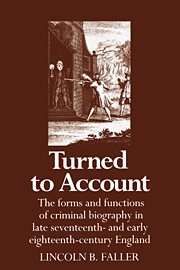 Turned to Account
Turned to Account Book contents
- Frontmatter
- Contents
- Preface
- Part I Turning criminals to account: three case histories and two myths of crime
- Part II Enucleating the truth: the criminal as sinner turned saint
- Part III Palliating his crimes: the thief as various rogues
- Postscript: Criminal biography and the novel
- Appendix I Who read the popular literature of crime?
- Appendix II The politics of thieving
- Notes
- Select bibliography
- Index
Postscript: Criminal biography and the novel
Published online by Cambridge University Press: 05 February 2012
- Frontmatter
- Contents
- Preface
- Part I Turning criminals to account: three case histories and two myths of crime
- Part II Enucleating the truth: the criminal as sinner turned saint
- Part III Palliating his crimes: the thief as various rogues
- Postscript: Criminal biography and the novel
- Appendix I Who read the popular literature of crime?
- Appendix II The politics of thieving
- Notes
- Select bibliography
- Index
Summary
I make no doubt but the Reader will think the remaining Part of this Story very odd, and perhaps a little improbable. However, if he considers the Characters of the Persons concern'd in the Adventure, he will find nothing related but what may be supposed to have been really acted. Boccace, La Fontaine, and other celebrated Writers have met with universal Applause for Histories less reconcileable to Truth than this. But, be that as it will … [t]he Writers of the Lives of Highwaymen who have gone before, are a sufficient Apology for this and many other unaccountable Relations, which must of necessity be interspersed in this Work. A Reader that cannot relish these Passages, will find enough for his Diversion without them, and those who have a pretty deal of Faith may easily stretch it to our Standard. At least what will not pass for real Truth, may please by the same Rules as many of our modern Novels, which are so much admired.
Charles Johnson, Highwaymen (1734), p. 114Two myths, then, define between them the sociopoetics of criminal biography in late seventeenth- and early eighteenth-century England. The one, highly structured and univocal, seeks to reintegrate the criminal into the social and moral order, to smooth over the disruptive effects of his behavior, to digest whatever cruelties he may have committed; the other, disjunctive and ambivalent, heightens his disruptiveness, invents and amplifies cruelties, presenting a fractured, etiolated, absurd, and often frankly fictitious version of his life and character.
- Type
- Chapter
- Information
- Turned to AccountThe Forms and Functions of Criminal Biography in Late Seventeenth- and Early Eighteenth-Century England, pp. 194 - 202Publisher: Cambridge University PressPrint publication year: 1987


